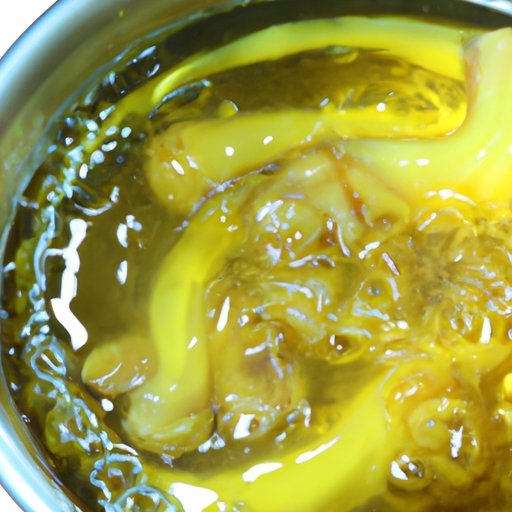
I. Introduction
Do you find yourself feeling bloated and uncomfortable after meals? Gas in the stomach can cause discomfort, bloating, and even embarrassment. Fortunately, there are natural ways to reduce gas production and promote digestive health. In this article, we’ll explore how diet modifications, exercise, supplements, and medications can help to decrease gas in the stomach and help you feel more comfortable.
II. Diet Modifications
A low-fat diet can reduce the amount of gas produced during the digestion process. In addition, eating slowly and chewing food longer can help to decrease the amount of air swallowed while eating. Here are some specific dietary tips for reducing gas:
- Avoid carbonated drinks, including soda and beer
- Avoid chewing gum and hard candy
- Avoid sugar-free products made with sorbitol, xylitol, and mannitol
- Avoid high-fiber foods like beans, lentils, cabbage, onions, and broccoli
- Limit intake of dairy products, especially if lactose intolerant
By making these small adjustments to your diet, you can significantly reduce gas production and increase digestive comfort.
III. Exercise
Regular exercise can help to promote bowel movement and decrease constipation, which are both factors that can lead to gas buildup in the digestive tract. Here are some exercise examples that can help with digestive health:
- Yoga or stretching exercises
- Light aerobic exercise like walking or jogging
Adding daily exercise to your routine can help to promote overall gut health and reduce gas symptoms.
IV. Digestive Enzymes
Digestive enzymes can be added to meals to aid in the breakdown of food and decrease gas production. Here are some common digestive enzymes and how they work:
- Lactase – breaks down lactose found in dairy products
- Alpha-galactosidase – breaks down complex carbohydrates found in beans and vegetables
- Lipase – breaks down fat molecules
By taking digestive enzymes before meals, you can help your digestive system break down food more efficiently and reduce gas symptoms.
V. Probiotics
Probiotic foods and supplements contain good bacteria that can promote healthy digestion and reduce gas production. Here are some examples of probiotics to include in your diet:
- Yogurt with live cultures
- Kefir
- Miso soup
- Sauerkraut
- Kombucha
By consuming these probiotic-rich foods, you can increase the beneficial bacteria in your gut and reduce gas production.
VI. Medications
Over-the-counter medications like simethicone, activated charcoal, and antacids can help to reduce gas and bloating symptoms. However, it’s important to speak to a healthcare professional before taking any medication, especially if you have underlying health conditions or are taking other medications.
VII. Conclusion
Gas in the stomach can cause discomfort and irritation, but there are many natural ways to reduce gas production and promote digestive health. By modifying your diet, increasing exercise, taking digestive enzymes, consuming probiotics, and possibly taking medications under the guidance of a healthcare professional, you can decrease gas symptoms and improve your overall quality of life.
Remember, if symptoms persist, it’s important to seek medical advice. But by trying these natural remedies and making small adjustments to your lifestyle, you can reduce gas in the stomach and help promote a healthier digestive system.





